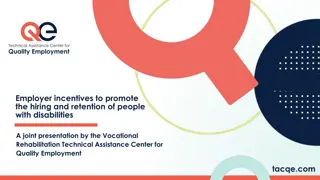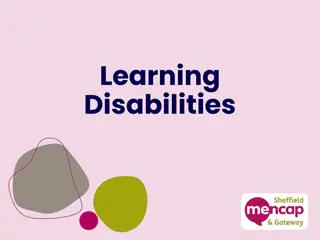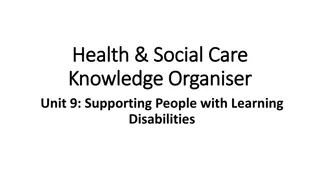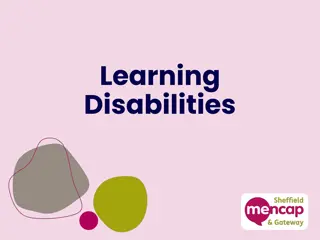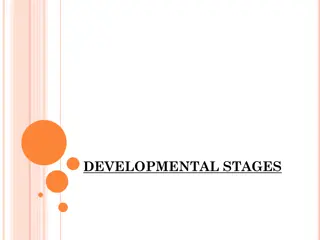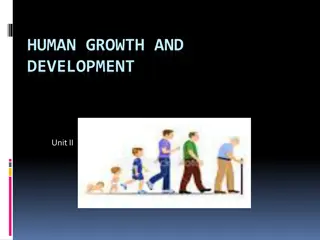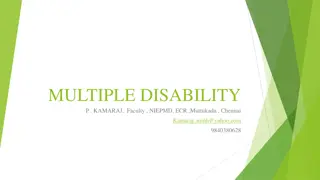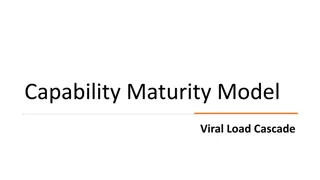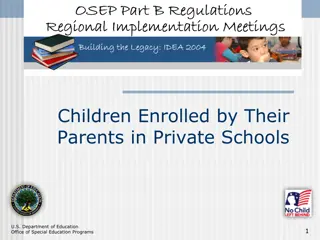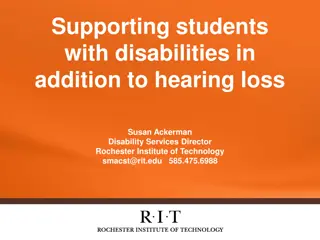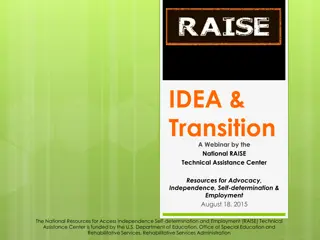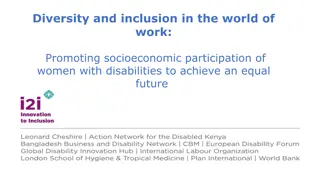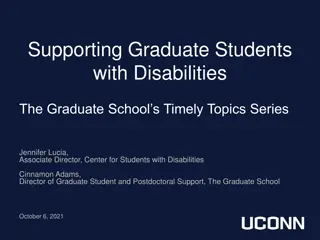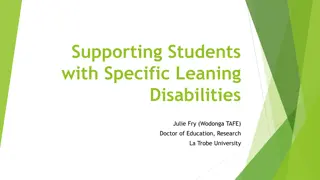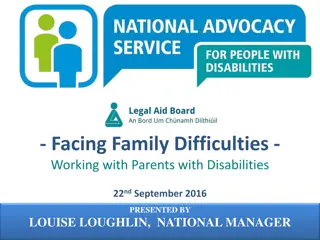Causes of Disabilities Across Different Stages of Life
Disabilities can arise at various stages of life, including prenatal, perinatal, infancy, early childhood, adolescence, adulthood, and old age. The causes of disabilities can be categorized into prenatal, perinatal, and postnatal factors. Prenatal causes include genetic deformities, maternal health issues, and drug use during pregnancy. Perinatal causes occur during birth, often due to poor treatment or oxygen deprivation. Postnatal causes encompass environmental factors, diseases, accidents, conflicts, and neglect. Understanding these causes is crucial in preventing and addressing disabilities.
Download Presentation

Please find below an Image/Link to download the presentation.
The content on the website is provided AS IS for your information and personal use only. It may not be sold, licensed, or shared on other websites without obtaining consent from the author. Download presentation by click this link. If you encounter any issues during the download, it is possible that the publisher has removed the file from their server.
E N D
Presentation Transcript
Disabilities can originate at any stage of life: prenatal, perinatal, infancy, early childhood, adolescence, adulthood and old age. Every person is one accident or illness away from becoming disabled.
There are so many causes of disabilities. We can categories those causes into the following 3 groups. Prenatal Causes: causes that occur before birth. Perinatal Causes: causes that occur during the birth process. Postnatal Causes: causes that happen after birth.
1. Pre Natal Causes (Before Birth) Genetic deformity X and Y Chromosomal Disability (weak chromosome) Mother suffering from any disease Weak health of the Pregnant mother Injury of the Pregnant mother Poor access to health care Use of drugs / Narcotics or any harmful things by the Pregnant mother
Many prescription and non-prescription drugs can affect the baby in many ways
2. Natal (Perinatal) Causes (During Birth) Perinatal causes occur during the birthing process. Poor treatment (unavailability of the experts, lack of the required facilities, mishandling, oxygen deprivation )at the time of birth can also cause different damage or permanent disability or disabilities to a child. They also include low birth weight.
3. Post Natal Causes (After Birth) Postnatal causes occur after birth. The environment is a major factor in many of these situations. Medicines and Injections Sever disease / Illness Accidents / Injuries Conflicts / Wars Dangerous at work place Age of the Mother: Child Abuse and Neglect,
Perinatal Causes of Disability The perinatal period is the time immediately before and after birth. Disabilities originating from this time period are primarily biomedical ones. They may result from prematurity, injury, oxygen deprivation, or infections acquired during the trip through the birth canal. Premature infants are babies who were born too soon. They are no more likely to have congenital disabilities than any other infant (Santrock & Yussen, 1989). Many premature infants require the use of oxygen and some suffer a form of blindness called "retinopathy of prematurity" caused by an excess of the very oxygen which preserved their lives (World Health Organization, 1992). Oxygen deprivation may occur during a prolonged or difficult birth, and, because the brain suffers damage very quickly without a fresh and adequate supply of oxygen, brain damage can result. The effects of this damage may include impairments in the areas of motor control, intelligence, and sensory processing. Several sexually transmitted diseases can result in severe disabilities due to nervous system damage (Shurtleff & Shurtleff, 1981)
Medicines and Injections Some medicines and drugs taken during pregnancy can cause disability in the baby. The overuse of injectable medicines, Alcohol and tobacco used during pregnancy can damage a developing baby and also can effect the breathing during birth. (deprives the baby of oxygen during birth).
Low Birth Weight Low birth weight is a major risk factor for disabilities and is definitely associated, with poverty and with little or no access to prenatal care.
Inherited Disabilities: Some disabilities are known to be inherited, Such as spinal muscular atrophy and muscular dystrophy (diseases of the muscle and of the nerve cells that carry signals from the brain to the muscle, making the muscles of the body get weaker and weaker and slowly stop working).
Chromosomal abnormalities can involve the loss, gain, or exchange of genetic material from a chromosome pair. Such abnormalities often cause miscarriages, but may occasionally result in a baby with some kind of disability (Bennett, 1981). Some disabilities are caused by specific genes that create damaging biomedical conditions. There are over 3,000 different genetic causes of disability (Ince, 1987).
Illness Some illnesses a pregnant woman may get can cause physical or learning problems when her baby is born. Illnesses that can cause birth defects include German measles (rubella), which is a common cause of deafness in newborn babies. Syphilis, herpes, and HIV can also be passed from a mother to her baby and can cause birth defects. So women need to be tested and treated for sexually transmitted infections to protect the baby developing in the womb. Some illnesses a baby or small child may get can also cause disability, such as meningitis, polio, and measles.
Accidents: Many Men get disabling injuries at Workplace accidents, especially in less regulated sectors such as construction, agriculture, mining, and smaller businesses, are also the common causes of disability. While, Many women disabling injuries at home by burns from cooking fires, falls, road accidents, and breathing or drinking toxic chemicals. and children get
Injuries The causes of these injuries include falls, swimming accidents, motor vehicle accidents, and physical violence.
Tiny babies are rather floppy and slippery, and they have a tendency to put things in their mouths. These characteristics place them at risk for two types of accidents. First, they can fall when they slip out of restraints intended to care for and protect them, such as people's hands, cribs, high chairs, and playpens (Saskatchewan Institute on Prevention of Handicaps, 1991). The resultant injuries can produce motor or intellectual impairments as well as temporary damage such as bruises and broken limbs. Second, they can choke on small objects such as tiny toys, or pieces of toys. This type of accident can result in suffocation, anoxia, and brain damage.
Poisons and Pesticides: Different forms of Poisons (such as lead found in paints), pesticides (such as rat poison, and other chemicals) can cause disabilities in people and cause birth defects in babies growing in the womb. Smoking or chewing tobacco, breathing smoke, and drinking alcohol during pregnancy can also harm a child before he/she is born. Workers often use chemicals on the job or in the fields without being taught how to use them safely, or without even knowing if they are dangerous. Accidents in factories can release poisons into the air, water, or ground, causing terrible health problems, including permanent disabilities.
Poverty and Mal-Nutrition: Poverty is also one of the causes of disability. As Poor people are most vulnerable to disability because they are forced to live and work in unsafe environments with poor sanitation, crowded living conditions, and with little access to education, clean water, or enough good food. This makes diseases such as tuberculosis and polio--and the severe disabilities they cause-- much more common because diseases get passed from one person to another more easily. Many babies who are born in poor families may be born with disabilities or may die in infancy. This may be because the mother did not get enough to eat when she was pregnant. Or it may be because she did not get enough to eat when she was a girl. Starting in childhood, a girl is often given less food to eat than a boy. As a result, she may grow more slowly and her bones may not develop properly, which can later cause difficulty during childbirth-- especially if she does not receive good health care. If a baby or young child does not get enough good food to eat, she or he may become blind or have trouble learning or understanding.
Conflicts / War Conflicts / Wars are also one of the main causes of Post-Natal Disabilities. Specially, In today's wars, more civilians than soldiers are killed or disabled, and most of them are women and children. Explosions cause people to become deaf, blind, and lose their limbs, as well as causing other injuries. Their mental health is also badly affected by the violence. The destruction of homes, schools, health centers, and means of livelihood that results from conflicts and wars leads to increased disability, poverty, and disease.
Dangerous Work Conditions: People who work in factories, mines or on agricultural plantations can be exposed to dangerous machinery, tools, or chemicals. Accidents, overwork chemicals can all cause disability. and exposure to
Age of the Mother: The age of the mother is another factor associated with an increased risk of impairment. Teen-age mothers, especially those under 15 years of age, have a greater risk of having babies with low birth weight (March of Dimes, 1989, 1992).
Poor nutrition and hunger Poor nutrition and hunger can have a negative effect on all aspects of a child's development.
Poor housing / Constructions Poor housing can be associated with a variety of disabling conditions. Chances of accidental injury increase when buildings are in poor condition. Cheap housing often consists of older buildings which may still have lead paint on walls and woodwork. Children often ingest this paint and get lead poisoning which affects the nervous system.
Prenatal Causes: Mother smoking during pregnancy: if the mother smokes cigarettes during pregnancy this increases the risk by 2.5 times. Mother drinking alcohol during pregnancy: With alcohol during pregnancy, there is the same increased risk - 2.5 times. bleeding in the baby's brain If there is bleeding in the baby's brain there is a 45 percent chance that that individual will have abnormal.


